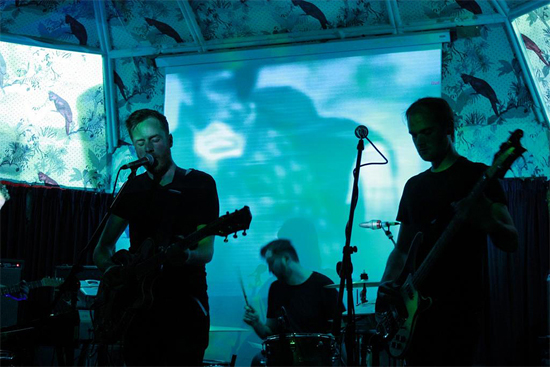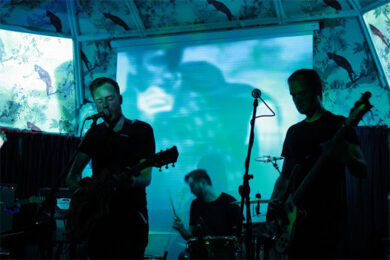Have the machines been listening? When premier guitar-wielding conceptualists I Like Trains released their streamlined, synthetic third album The Shallows in May – in-part inspired by the same-titled Nicholas Carr book that addresses humanity’s passive technology addiction – they might not have reckoned on their tools answering back. For the first couple of tracks tonight there’s an etched expression of disarray appearing on the face of usually outwardly self-assured front man Dave Martin, as monitors fail to work and electronic triggers fail to fire. Thus with cruel irony, they find themselves facing the prospect of giving their audience a rather more literal representation of man’s reliance on electronics than they might have envisioned or intended.
However the five-piece have developed something of a collective hard-headedness over their eight years together. Their first notable release, EP Progress Reform, appeared in 2006, at a time when the music industry and the main alternative music press were about ready to move on from an infatuation of all music Yorkshire-based, having already decided already that The Cribs, The Kaiser Chiefs and The Arctic Monkeys were who they were taking back down south with them. It didn’t fall through the cracks as such, but their debut LP Elegies To Lessons Learnt – a thematic furthering of Progress Reform‘s solemn hallows to some of history’s most tragic curios – did; they were dropped by Beggars Banquet as the pinch of online music piracy tightened in 2007. Fight or flight; it was the former they chose, starting their own press company, hiring out their own tour van, and successfully using the PledgeMusic website to raise funds for their second LP He Who Saw The Deep. It is one thing to start from nothing and struggle towards the summit, it’s quite another to get a good way up only to be cast back towards your start point again.
Is it that struggle that gives these live sets a feeling of teeth gritted and stoical determination? Or is there more? I Like Trains pitched characters including Antarctic explorer Captain Scott, British prime minister Spencer Perceval and round-the-world sailor Donald Crowhurst as almost predetermined for failure, but in their requiems ‘Terra Nova’, ‘Spencer Perceval’ and ‘The Deception’, they acquitted them with a firm chin and a steely resolve in the face of their impending exeunt. Similarly, He Who Saw The Deep met prospects of civilization’s demise to an environment pushed too far with an unflinching stare. They are a group who, in an age where it can feel as though the more information we have the more we as a species fear to know, surmise that the best way to be freed from that fear is to confront its source head on.
In the context of tonight’s performance, it’s something they apply at the close of second song ‘Progress Is A Snake’, after its usually relentless doom-laden march occasionally teeters at the sight of their instruments’ gremlins. Giving up the ghost and ditching the pads and controllers that drummer Simon Fogal was to use, in addition to the increasingly lean rhythms he draws from his kit, they instead gloriously meet the challenge of going by, as Martin stops to tell us "flying by the seat of our pants". Initial reservations dissolve away after ‘Water/Sand’, as the group place emphasis of back to their more overtly atmospheric rock. ‘The Hive’ becomes more of a battle than the smooth crescendo of its studio counterpart, but there’s defiance in the band’s eyes as their gathering guitars raise Martin’s baritone vocal to its apex, making a mockery of their actual hive as it lies electronically lifeless at their feet.
One noticeable aspect of a set that spans back to their beginnings (though Elegies… is conspicuous by its absence) is that the underlying themes that I Like Trains impress upon remain constant, even as the backdrop behind them alters. History repeats, the same mistakes are made ad infinitum until tonight’s penultimate track ‘Sea Of Regrets’, an epilogue for the end, where realisation of our unchangeable path finally dawns. The decision to include Progress Reform‘s ‘A Rook House For Bobby’ – released when they could loosely be filed next to the expanse and rumble of those associated with the troublesome "post-rock" tag – highlights the relevance its narrative still has in 2012. Chess Grandmaster Bobby Fischer found himself an unwanted pawn used by the USA during the height of the Cold War with the Soviet Union. The song highlights the deep mistrust of its global rivals that America had at the time; yet 40 years since Fischer crumbled into reclusion after beating Soviet player Boris Spassky for the World Championship, Stateside paranoia is arguably greater than even then. Political blog [Informed Comment] recently wrote that, if elected, Republican presidential candidate Mitt Romney could conceivably plan to begin five further wars during his term; the seriousness with which his campaign is being taken suggests his aggressive view of the Middle East, in particular, is one shared by many there.
This is what gives I Like Trains songs such impact: these are not really conceptual songs. What lyricist Martin delivers in the words of ‘Progress Is A Snake’, ‘Sea Of Regrets’ ‘Mnemosyne’ is not far-fetched dystopia. Yes, he embellishes, he references mythology and paints grander pictures as a result; but he’s a story teller, he employs these tools in a way great narrators should. They’re potent because of their close proximity to the truth; as we’re told sea levels are rising, that we’re slipping unconsciously into a fully a fully online world, we switch off, we’re given distractions, we listen to flotsam electronica, air-filled pop, lo-fi constructions of nothingness. No, of course music shouldn’t be approached with such solemnity by everyone, but at times it feels like bands such as I Like Trains are increasingly marginalised because they still use music as a medium of message, one that’s easier to hide under the deluge of hipster run-offs and under rehearsed retromaniacs than it is to face.
As story tellers, it stands to reason that it’s in the physical interaction of a live environment where they’re at their best. It’s where Martin comes into his own as raconteur, with a stare glaring enough to stop you at fifty paces, and a voice that floods with emotion as he connects to both characters he’s portraying and – on the newer material – through a more direct route to his own inner beliefs. Then there are songs where the deep welling of affection is total before a word’s been uttered in mourning; ‘Terra Nova’, five minutes of bombast that first turned heads six years ago, guts you with its haunting guitar line, images of Captain Scott’s perished party flashing up behind the band, a song never delivered as anything less than sincere tribute. It has a rival in their back catalogue now, though: ‘Reykjavik’ closes this evening and it towers over what’s gone before, Martin’s resigned intonation when singing "we turned our backs to the scene, you only told us what we wanted to believe" playing off wonderfully against a scaling instrumental melody that contrastingly begs you to pay attention, its coda is elongated and amplified for devastating dramatic effect. I Like Trains aren’t doling out themes of apocalypse in academic style; it’s delivered beautifully, sorrowfully taking stock of all that we’re losing, and it makes you care that we’re losing it. It’s more comfortable than ever to switch off from life, to lose yourself to technological distraction; tonight we’re reminded of what we’ve let decay by doing that, and it makes you want to grab onto it as tightly as possible.



